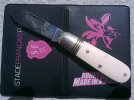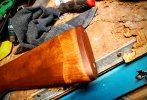- Joined
- Apr 5, 2018
- Messages
- 160
Stress And The Strop
Stopping to admire the mirror like polish the edge is beginning to take, I check my angles and resume brushing the pocket knife up and down the strip of leather hanging from an old eye- hook bolted to the frame of my workshop. This process, known as stropping, remains after many centuries the final step in achieving a razor sharp blade. The rhythm and cadence of the task is soothing. Fifteen strokes on the mark side, the warm whisper of steel on hide, fifteen strokes on the pile side, the sweet smell of polishing compound, seven strokes on the mark side — a temporary escape from the stresses and expectations of modern adult life.
I can’t help but wonder what stresses someone may have been escaping from while stropping their blade a hundred years ago or more. It’s easy to romanticize the past — to think, “Those were simpler times,” yet to do this is to marginalize the struggles of our ancestors. A fellow knife collector once called it, referring to when his knife was made, “back when times were simple but hard.” That’s more like it. Seven strokes on the pile side, the soil isn’t producing like it did last year, three strokes on the mark side, the pigs are getting sick…
The difference, I suppose, is that back then you knew you were doing good when your children survived infancy and you were able to keep food on the table through winter. Today, in the wealthy parts of the world anyway, mortality is rarely a mark of failure, and the indicators of success are no longer so clear. I have a theory that I’ve been ruminating on for some time now and I suspect that it is relevant to this little vignette: That anxiety is an export of the modern world — the tell tale sign of a lost generation.
Today, with every possible good and service available for purchase at the click of a button, who among us other than the artists and artisans actually make anything that they can hold with their hands and take pride in? I spent the last six months of my life working every day on a spreadsheet that is unlikely to ever leave “The Cloud” — not exactly an heirloom quality rocking chair to be cherished for another century or more. This disconnect between hard work and tangible results can leave a person feeling empty and lacking in purpose.
But when I take a pocket knife from dull to sharp, when it goes from ripping a piece of paper to feeling like it unzips the atoms one by one — that’s something I can feel, something that I did, something that I can take pride in just for myself. Three strokes on the pile side, one stroke on the mark side, one stroke on the pile side. I test the new edge for sharpness by shaving a small patch of hair off of my left arm. Back into my pocket the knife goes. Finals are coming up next week, and my left arm is nearly bare.
Stopping to admire the mirror like polish the edge is beginning to take, I check my angles and resume brushing the pocket knife up and down the strip of leather hanging from an old eye- hook bolted to the frame of my workshop. This process, known as stropping, remains after many centuries the final step in achieving a razor sharp blade. The rhythm and cadence of the task is soothing. Fifteen strokes on the mark side, the warm whisper of steel on hide, fifteen strokes on the pile side, the sweet smell of polishing compound, seven strokes on the mark side — a temporary escape from the stresses and expectations of modern adult life.
I can’t help but wonder what stresses someone may have been escaping from while stropping their blade a hundred years ago or more. It’s easy to romanticize the past — to think, “Those were simpler times,” yet to do this is to marginalize the struggles of our ancestors. A fellow knife collector once called it, referring to when his knife was made, “back when times were simple but hard.” That’s more like it. Seven strokes on the pile side, the soil isn’t producing like it did last year, three strokes on the mark side, the pigs are getting sick…
The difference, I suppose, is that back then you knew you were doing good when your children survived infancy and you were able to keep food on the table through winter. Today, in the wealthy parts of the world anyway, mortality is rarely a mark of failure, and the indicators of success are no longer so clear. I have a theory that I’ve been ruminating on for some time now and I suspect that it is relevant to this little vignette: That anxiety is an export of the modern world — the tell tale sign of a lost generation.
Today, with every possible good and service available for purchase at the click of a button, who among us other than the artists and artisans actually make anything that they can hold with their hands and take pride in? I spent the last six months of my life working every day on a spreadsheet that is unlikely to ever leave “The Cloud” — not exactly an heirloom quality rocking chair to be cherished for another century or more. This disconnect between hard work and tangible results can leave a person feeling empty and lacking in purpose.
But when I take a pocket knife from dull to sharp, when it goes from ripping a piece of paper to feeling like it unzips the atoms one by one — that’s something I can feel, something that I did, something that I can take pride in just for myself. Three strokes on the pile side, one stroke on the mark side, one stroke on the pile side. I test the new edge for sharpness by shaving a small patch of hair off of my left arm. Back into my pocket the knife goes. Finals are coming up next week, and my left arm is nearly bare.
Last edited:




